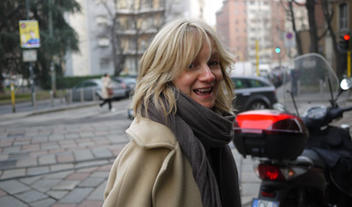
Shari Robertson
Director/Producer
When we finished Well-Founded Fear, Michael and I thought we‘d be going back to the kind of films we had been doing, both separately and later together, for most of our careers -- films usually shot outside the United States, often in places we hadn‘t known all that much about before we started the film. We loved working together, because we shared a kind of approach to understanding people and places -- and also to seeing, literally, and eavesdropping -- that came out of a mix of anthropology and pretty long experience as the slightly marginal individuals that documentary filmmakers become. (Or just are.)
I‘d studied anthropology in college, then eventually learned the basics of filmmaking at the Anthropology Film Center in Santa Fe, NM, not so far from Alamogordo where I‘d grown up. But it was back in East Texas, where my family is really from, that I first learned a lot of the observational and performance skills needed for documentaries, from the southern ladies who were my relatives and family friends. When I finally was introduced to ethnographic film and the work of masters like Jean Rouch much later, it all made sense.
This business turned out to be a wonderful way to learn about the world -- first, with real anthropologists for almost a year spent with the Bosavi people in the Southern Highlands of Papua New Guinea, and couple of years later, directing a run of films for English and European TV that began with the camps on the Thai-Cambodian border and moved successively into Cambodia to examine the reasons for the Khmer Rouge years.
I co-founded my first production company, Ophidian Films, with anthropologist David Feingold in Bangkok. From Southeast Asia, the next serious project for Ophidian (and the first time I worked with Michael as the shooter) was the US “War on Drugs” in Peru, at a time when the Maoist guerilla group Sendero Luminoso was at its height.
Michael and I started a company together after that. We wanted to combine our experience and do a series of films on the big questions that arose once people were moving across borders and around the world as a result of the end of the Cold War. We were still trying to fund that idea when the opportunity to make a film for The Forum Of African Women Educationalists came up. These Girls Are Missing, which we shot in Malawi and Guinea, looks at the deep social and cultural reasons so few girls graduate from school in Sub-Saharan Africa.
Our idea for that series on migration did happen later, in a way, as a single feature documentary filmed inside the political asylum system in the United States. Well Founded Fear was our first real opportunity to have the kind of conversation with American audiences that an extended festival run permits. We loved those conversations, and in the end that‘s probably why we found ourselves in Washington in the summer of 2001, even though we were dying to get back on the road again. DC seemed like one of the safest places I‘d ever tried to work when we started -- but that was only because I was so dumb about where we were, and what we‘d learn this time.




















